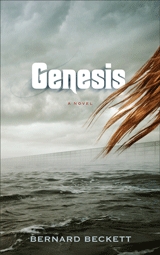Though a slim 150 pages long, Genesis by New Zealand author Bernard Beckett packs a walloping philosophical punch. In this novel, the author asks readers to rethink their notions of consciousness and the human mind.
The story begins with an examination. Young Anaximander is to be examined by the Academy, the ruling council of the only islands on Earth where technology has survived after an apocalypse. In her examination, Anax must defend her thesis like any master’s degree student. Anax has chosen the life of Adam Forde, the man who overthrew the previous government, as her topic. What unfolds during the oral exam is a story that is strange and thought-provoking with an astonishing ending.
Beckett constructs Genesis very differently from standard storytelling. For one, the conversations between Anax and her examiners take place entirely in script-like dialogue.
EXAMINER: Is there anything you would like to ask, before we begin?
ANAXIMANDER: I would like to ask you what the answers are.
EXAMINER: I’m sorry. I don’t quite understand
ANAXIMANDER: I was joking.
EXAMINER: Oh. I see. (p.4)
This script style dialogue is interspersed with the internal thoughts of Anax, in which she reacts to the things she or the examiner said, making judgment calls, much the same way any person undergoing a rigorous oral examination would analyze, replay, and second-guess him- or herself.
Secondly, the story, especially in its early portions, contains grand swaths of information dumps detailing the history that has led to the future Earth in which Anax and her Examiners live. Generally speaking, it is better to weave world-building and background into the story naturally, rather than pausing to give the reader the history in one big monologue by the “knowledgeable” character. But contrary to the norm, in Beckett’s story the inclusion of information dumps works very well. By placing the story in the context of a historian taking an oral examination, the laying of the historical groundwork is logical. And Beckett makes sure not to make this a dry recitation of facts, either, which certainly helps.
Beckett does not rely on just these two methods to tell the tale. Beginning in the section entitled “The Third Hour,” Anax begins to use holograms she constructed to help tell the story, and in this way Beckett brings in the sort of third person style narration most readers of fiction are used to. We watch conversations occur between the subject of Anax’s examination, Adam Forde, and his companion Art. While these two engage in philosophical discussions, Anax and the Examiners look on.
Unfortunately, in a couple of places, Beckett does violate his literary constructions. Because of the way the story is written, as if Anax and the Examiners were watching the events unfold, any description that uses an omniscient narrator should not occur. However, in the copy I read, this happens a few times.
As he spoke Art traversed the room, his three fingered hands joined behind his back in a schoolmaster parody .It was a compelling performance, and no matter how hard he might have been trying not to listen, Adam was all ears. (p.95)
That last phrase, since it is not coupled with a physical indicator like movement or speech modulation that would imply the conclusion, is something only an omniscient narrator would know. An argument could be made that because Anax constructed the hologram, and it is through her eyes we are watching it, that she is omniscient for the purposes of the hologram. But I think that since elsewhere Beckett has been careful not to violate this restriction, “Adam considered this for a moment then nodded. The first tremors of hope played about his eyes” (p.132), then he should not violate it at all. Added to the fact that the book is rather short, any occurrence of this type of narration becomes glaring. But this is a minor literary infraction, and will be overlooked in the excitement of the story by most readers.
Which brings me to the best part of this science fiction tale, that of the theme. Beckett is addressing head-on theories on the origins of life (hence the title), and from there to theories of consciousness, of the mind, and of the nature of the soul. But never once does he allow the story to drag. These philosophical discussions, while Socratic in nature, are not the heavy ponderous things readers study in school, but exciting arguments with simple, clear examples of meaning used to explain complex ideas. Where Aristotle used the Allegory of the Cave, Beckett appropriately chooses the Chinese Room. The war of beliefs between Adam Forde and Art is fascinating to read, even if the final conclusions are arguable.
Beckett also makes sure that the story lacks nothing in mystery and intrigue. In the meta-narrative of Anax, readers will desire her success. Like her, we too have been a student under bright lights, and from page one anyone who has ever been a higher education student will immediately identify with her. The narrative of Adam Forde, his personal history in overthrowing the socialistic Republic of Plato, is filled with action, characters of interest and import, and deep, thought-provoking dialogue. The climax of the novel is not in the place you think, and the event you thought ends the story is really just the beginning.
This novel is one of the best I have ever read. Beckett is every fiction fan’s ideal philosopher, the type of writer who entertains as much as he questions. Fans of Vernor Vinge or Isaac Asimov will enjoy Genesis. The creative construction of the novel should delight students of literature, as it will readers who enjoyed dystopian novels like Cormac McCarthy’s The Road or Kit Reed’s Enclave. Bernard Beckett is an amazing new talent in science fiction. Genesis is a must read.










